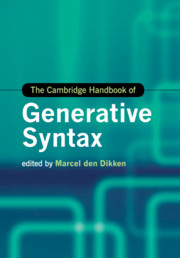Description
The Cambridge Handbook of Generative Syntax
Cambridge Handbooks in Language and Linguistics Series
Coordinator: den Dikken Marcel
A comprehensive survey of the field of generative syntactic research in all its variety, written by leading experts.
Language: English
Subject for The Cambridge Handbook of Generative Syntax:
The Cambridge Handbook of Generative Syntax
Publication date: 04-2020
Support: Print on demand
Publication date: 04-2020
Support: Print on demand
The Cambridge Handbook of Generative Syntax
Publication date: 07-2013
1164 p. · 17.8x25.3 cm · Hardback
Publication date: 07-2013
1164 p. · 17.8x25.3 cm · Hardback
Description
/li>Contents
/li>Biography
/li>
Syntax ? the study of sentence structure ? has been at the centre of generative linguistics from its inception and has developed rapidly and in various directions. The Cambridge Handbook of Generative Syntax provides a historical context for what is happening in the field of generative syntax today, a survey of the various generative approaches to syntactic structure available in the literature and an overview of the state of the art in the principal modules of the theory and the interfaces with semantics, phonology, information structure and sentence processing, as well as linguistic variation and language acquisition. This indispensable resource for advanced students, professional linguists (generative and non-generative alike) and scholars in related fields of inquiry presents a comprehensive survey of the field of generative syntactic research in all its variety, written by leading experts and providing a proper sense of the range of syntactic theories calling themselves generative.
Part I. Background: 1. Introduction Marcel den Dikken; 2. Brief overview of the history of generative syntax Howard Lasnik and Terje Lohndal; 3. Goals and methods of generative syntax Frederick Newmeyer; Part II. Modern Generative Approaches to the Study of Sentence Structure: 4. Principles and parameters theory and minimalism Željko Bošković; 5. Minimalism and optimality theory Hans Broekhuis and Ellen Woolford; 6. Lexical-functional grammar Peter Sells; 7. Phrase structure grammar James Blevins and Ivan Sag; 8. Tree adjoining grammar Robert Frank; Part III. Syntactic Structures: 9. Argument structure and argument structure alternations Gillian Ramchand; 10. The syntax of predication Caroline Heycock; 11. Lexical categories and (extended) projection Norbert Corver; 12. The functional structure of the sentence, and cartography Luigi Rizzi; 13. Adverbial and adjectival modification Artemis Alexiadou; Part IV. Syntactic Processes: Their Nature, Locality, and Motivation: 14. Economy of derivation and representation Samuel David Epstein, Hisatsugu Kitahara, Miki Obata and T. Daniel Seely; 15. Syntax, binding and patterns of anaphora Ken Safir; 16. Raising and control Maria Polinsky; 17. Agreement and case Mark Baker; 18. The locality of syntactic dependencies Marcel den Dikken and Antje Lahne; Part V. Syntax and the Internal Interfaces: 19. Ellipsis phenomena Jeroen van Craenenbroeck and Jason Merchant; 20. Tense, aspect and modality Karen Zagona; 21. Negation and negative polarity Hedde Zeijlstra; 22. The syntax of scope and quantification Veneeta Dayal; 23. Syntax, information structure and prosody Daniel Büring; Part VI. Syntax and the External Interfaces: 24. Microsyntactic variation Sjef Barbiers; 25. Parameters: the pluses and the minuses Rosalind Thornton and Stephen Crain; 26. Syntax and the brain Jon Sprouse and Ellen F. Lau.
Marcel den Dikken is a professor of linguistics at the Graduate Center of the City University of New York.
© 2024 LAVOISIER S.A.S.
These books may interest you

The Routledge Handbook of Syntax 256.94 €

The Routledge Handbook of Syntax 61.25 €

Essays in Syntactic Theory 64.97 €

